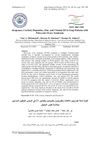70 citations,
February 2016 in “EMBO reports” Scientists found a specific group of itch-sensing nerve cells in mice important for feeling itch but not for sensing heat or touch.
 70 citations,
January 2000 in “Hormone Research in Paediatrics”
70 citations,
January 2000 in “Hormone Research in Paediatrics” SAHA syndrome is a condition in women involving skin and hair issues, often related to hormonal imbalances, and is treated based on the underlying cause.
 August 2019 in “Journal of Invertebrate Pathology”
August 2019 in “Journal of Invertebrate Pathology” Thymosin beta 4 protects cells from damage by blocking a harmful microRNA and boosting a protective gene.
 19 citations,
November 2012 in “British Journal of Dermatology”
19 citations,
November 2012 in “British Journal of Dermatology” Dopamine stops hair growth and pigment production in human scalp hair follicles.
4 citations,
January 2016 in “Methods in molecular biology” Hair follicle stem cells can become nerve cells using specific treatments.
 December 2019 in “bioRxiv (Cold Spring Harbor Laboratory)”
December 2019 in “bioRxiv (Cold Spring Harbor Laboratory)” Redheaded people have higher levels of a vitamin D precursor, suggesting red hair may be an adaptation for better vitamin D synthesis in areas with less sunlight.
450 citations,
January 2005 in “The journal of investigative dermatology/Journal of investigative dermatology” Hair color is determined by melanin produced and transferred in hair follicles.
 11 citations,
April 2017 in “Journal of The European Academy of Dermatology and Venereology”
11 citations,
April 2017 in “Journal of The European Academy of Dermatology and Venereology” Found different long non-coding RNAs in balding Chinese men, which may help create new treatments.
 36 citations,
March 2019 in “European Journal of Human Genetics”
36 citations,
March 2019 in “European Journal of Human Genetics” The research found genetic differences in identical twins that could explain why one twin has a disease while the other does not.
 January 2019 in “Clinical neuropharmacology”
January 2019 in “Clinical neuropharmacology” A girl's hair-pulling condition improved greatly after she started vitamin D treatment.
 25 citations,
April 2012 in “Acta Biomaterialia”
25 citations,
April 2012 in “Acta Biomaterialia” Using certain small proteins with a growth factor and specific materials can increase the creation of neurons from stem cells.
119 citations,
February 2009 in “Neuroscience & Biobehavioral Reviews” Trichotillomania involves hair pulling and can be treated with therapy and medication.
18 citations,
October 2014 in “In vitro cellular & developmental biology. Animal” Hair follicle stem cells can become neural cells using different methods, with varying efficiency.
4 citations,
April 2020 in “Reports of Practical Oncology & Radiotherapy” Prostate cancer patients need early psychological and sexual support during radiotherapy to improve their quality of life.
 9 citations,
November 2021 in “Frontiers in Cell and Developmental Biology”
9 citations,
November 2021 in “Frontiers in Cell and Developmental Biology” PBX1 helps reduce aging and cell death in hair follicle stem cells by decreasing DNA damage, not by improving DNA repair.
 9 citations,
March 2013 in “Expert opinion on biological therapy”
9 citations,
March 2013 in “Expert opinion on biological therapy” Epidermal stem cells have potential for personalized regenerative medicine but need careful handling to avoid cancer.
 71 citations,
February 2020 in “Journal of Translational Medicine”
71 citations,
February 2020 in “Journal of Translational Medicine” Progress has been made in skin and nerve regeneration, but more research is needed to improve methods and ensure safety.

Women with polycystic ovary syndrome (PCOS) show higher levels of hope, judgement, perspective, and transcendence, and could benefit from positive psychology therapy.
 12 citations,
July 2021 in “Scientific Reports”
12 citations,
July 2021 in “Scientific Reports” Glutamic acid helps increase hair growth in mice.
 4 citations,
February 2022 in “Nutrients”
4 citations,
February 2022 in “Nutrients” Korean Red Ginseng saponins may protect skin from inflammation and darkening caused by air pollution.
 February 2025 in “Iraqi Journal of Science”
February 2025 in “Iraqi Journal of Science” PCOS patients have higher LDH and lower cortisol, dopamine, zinc, and vitamin D3, which may contribute to their symptoms and obesity.
 128 citations,
March 2006 in “American Journal of Pathology”
128 citations,
March 2006 in “American Journal of Pathology” Prolactin contributes to hair loss by promoting hair follicle shrinkage and cell death.
 19 citations,
September 2019 in “PLOS genetics”
19 citations,
September 2019 in “PLOS genetics” Telomere damage affects skin and hair follicle stem cells by messing up important growth signals.
















